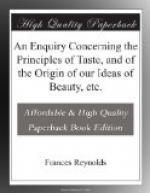On meditating on this subject, and marking the progressive stages or degrees of human excellence, the great leading general truths, or mental rests, as I may call them, the common, the beautiful, the graceful, and the sublime, I have been naturally led to form a kind of diagrammatic representation of their respective distances, &c. &c. which I present to my reader on the opposite page, requesting him to refer to it now and then as he goes on, in order to facilitate his comprehension of my meaning.
And here it may be necessary to premise, that, however whimsical and absurd this delineation may appear to my reader, something analogous to the thought may be found in the works of many eminent philosophers, particularly in those of Bacon[A] and of Locke:[B] the latter suggesting that the whole system of morality might be reduced to mathematical demonstration; and the former, in his treatise on the Advancement of Learning, gives a description of the stages of science very much resembling my delineation of the stages of intellectual perfection, or taste.
[Footnote A: Advancement of Learning, Book 2d.]
[Footnote B: Essay on human Understanding, Chap. 3d, Book the 4th, and Chap. 12th, same Book, Sect. 8th.]
It could have been no dishonour to me to have been led by such conductors! Yet, as the truth cannot dishonour me neither, I must aver, that my little system was projected, and brought to the exact state it now is in, without my having the least apprehension that any thing similar had been suggested before by any person whatever; nor have I, in consequence of the discovery I have lately made of the opinions of these respectable authors, added or omitted a single thought in my treatise. But to return from my digression.
In the exact center of my circle of humanity, I have placed nature, or the springs of the intellectual powers, which tend, in a straight line, to its boundary; and, on its boundary, I have placed demonstrable beauty and truth, and the utmost power of rules; and, midway; I have placed common sense and common form, half deriving their existence from pure nature, and half from its highest cultivation, as far as art or rules can teach. A conjunction which would itself be the perfection of humanity, but that it is mixed with all that is not nature, and all that is not art, and thereby made mediocrity, i.e. common sense.
The intellectual powers, arriving at the limit of my common circle, i.e. at the limit of the basis of my pyramidical system, where I have placed the fixed proportions of beauty and of truth, (if they progress,) mount up as a flame, with undulating[A] motion, refining as they advance, and terminate in the pinnacle, or ultimate point, sublimity; forming in the imagination the figure of a pyramid, or cone, from the limit of whose base, (on which, as I have before observed, I have placed demonstrable truth and beauty, the utmost power of rules, &c.)




